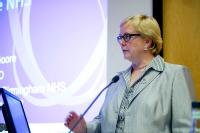WMG News
One of UK’s foremost NHS chief executives to lead Healthcare Systems activities at WMG
 It was announced today, Thursday 26th April 2018, that Dame Julie Moore, currently Chief Executive of University Hospitals Birmingham NHS Foundation Trust (UHB), is to become a Professor of Healthcare Systems at WMG, University of Warwick. Her new role will see her leading on a range of both research and education projects, leading collaborations with the NHS and other healthcare providers.
It was announced today, Thursday 26th April 2018, that Dame Julie Moore, currently Chief Executive of University Hospitals Birmingham NHS Foundation Trust (UHB), is to become a Professor of Healthcare Systems at WMG, University of Warwick. Her new role will see her leading on a range of both research and education projects, leading collaborations with the NHS and other healthcare providers.
Dame Julie has held the position of Honorary Professor, at WMG, since 2013. In that time she has delivered three thought provoking and informative special lectures covering topics such as ‘Is the NHS Succeeding or Failing?’
Professor Stuart Croft, Vice Chancellor of the University of Warwick said
“This is a stellar appointment. Nursing Times has described Dame Julie one of the best leaders in the NHS, and Radio 4’s Woman’s Hour has named her as one of the 100 most powerful women in the UK. I have no doubt that her new research role here with us in WMG at the University of Warwick will result in transformative research that will help enhance the delivery of healthcare across the UK.”
